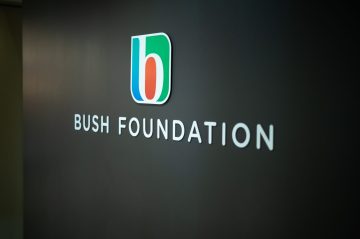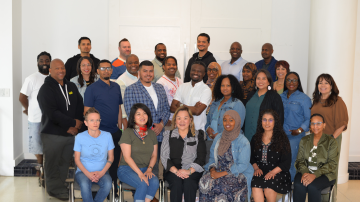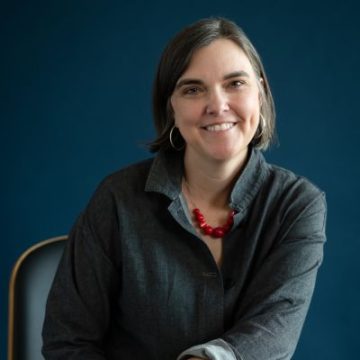News
Bush Foundation Makes New Major Investments in Education
Major investments will help expand proven strategies, launch new and potentially transformational ideas, and inform the Foundation's focus for future funding in education.
DATE
October 13, 2015
The future of instruction and learning may be taking root in South Dakota.
Technology & Innovation in Education (TIE), a division of Black Hills Special Services Cooperative, is working with schools and communities to implement customized learning strategies in schools across the state. In contrast to the one-size-fits-all approach that defines traditional school models, customized learning tailors instruction and learning to a student’s unique learning style, cultural background and aspirations. The idea is that students will be more engaged – and therefore more successful – if they are equipped to learn in a manner and at a pace that best suits their individual style and needs.
“The work TIE is leading in South Dakota could transform the way students learn across the country. TIE’s initial customized learning pilot in four schools generated promising results for students and a lot of excitement among educators. We are thrilled to support the expansion of projects like this with our major investments,” said Kayla Yang-Best, the Bush Foundation’s education director.
The Bush Foundation will invest $4 million over the next four years to help TIE expand customized learning to more schools and students across South Dakota. Dr. Julie Mathiesen, TIE’s executive director, said the investment will help position her organization to build strong partnerships with schools to support the design and implementation of customized learning strategies.
“The dominant approach to learning and instruction is roughly the same today as it was 150 years ago. Strategies like customized learning can chart the course for how we bring our education system into the 21st century. But developing, testing and implementing new and more effective models does not happen overnight. It takes time, dedication and resources. We are grateful for the Bush Foundation’s investment in our work and excited for what the future holds for students in South Dakota,” Mathiesen said.
Where Black Hills Special Services Cooperative is working to make education more relevant to a student’s individual strengths, Standing Rock Sioux Tribe is leading an effort to make education culturally relevant for Native American students.
Making education culturally relevant
The Standing Rock Sioux Tribe is confident that making indigenous language and culture core to classroom instruction is an essential step toward a brighter future for Native youth, their families, and the greater tribal community.
The Bush Foundation will invest $1 million over the next three years to increase capacity for Lakota and Dakota learning and instruction in classrooms throughout the Standing Rock Sioux Reservation. The effort will be led by the Standing Rock Sioux Tribe, working in partnership with Sitting Bull College and the Lakota Language Consortium. Standing Rock Tribal Chairman Dave Archambault II said the investment will have tremendous impact in the classroom and beyond.
“Our language is key to our cultural identity as Lakota and Dakota people. This investment will help us create deeper connections between students and their culture, get more students engaged in their education, and ensure that our language and our Nation thrives for generations to come,” Chairman Archambault said.
The investment will help create a Lakota/Dakota language institute on the Standing Rock Sioux Reservation. The Institute will produce elementary, middle and high school teachers with the knowledge and skills necessary to incorporate indigenous language and culture into the classroom and in various subject areas. This strategy builds off the Lakota/Dakota Summer Institute, a 3-week summer program that attracts individuals from across the region and beyond. The institute will allow the Tribe to expand upon their efforts to create and share curriculum in the language across the region, including through an online learning portal.
“The Standing Rock Sioux Tribe and its partners have already contributed so much to our understanding of the importance of cultural relevance in education. Continuing this work will help Native and non-Native communities develop and implement culturally relevant education strategies,” said Allison Barmann, the Foundation’s Vice President for strategy and learning.
A Year of Learning and Transition
These are among several new major investments the Bush Foundation is making to advance ideas to improve postsecondary success for students of all backgrounds in Minnesota, North Dakota, South Dakota and the 23 Native nations that share the same geography.
The investments are the result of a year-long effort to identify new opportunities for the Foundation to make a positive impact on postsecondary success in the region. They will help expand strategies with a proven record of success and launch new ideas with potential to transform the education system.
In January 2015, the Foundation issued a call for ideas and received more than 240 proposals. The Foundation’s education team conducted a thorough, months-long due diligence process that included site visits and consultations with education and community leaders from across the region. Pam Moret, the Chair of Foundation’s Board of Directors, said the process not only identified great ideas that will receive major investments this year, it also informed how the Foundation will refine the focus of future investments.
“The staff will be working over the next few months to clarify what types of investments we will be looking to make in future years. There is particular interest in efforts to make education more relevant for students – relevant in terms of who they are, how they learn, and what they aspire to do. At the end of the day our focus is to help all students gain the skills they need to achieve their career and life ambitions,” Moret said.
The Foundation made investments to advance the following ideas:
Increase the number of quality childcare providers.
Children who attend high quality childcare are nearly twice as likely to be school ready. Generation Next and Think Small will partner to equip childcare providers in Hennepin and Ramsey counties with training and resources designed to increase the quality of care they provide. The partners will offer over 100 licensed childcare providers small business training, literacy resources, coaching and parent outreach skills. ($3,000,000 over three years)
Increase access to high performing schools.
Minnesota Comeback is creating the Great MN Schools Fund to ensure students from all backgrounds have access to high-quality schools. The Fund will support the start-up, replication and expansion of high-quality schools identified through multiple criteria. Minnesota Comeback will explore what makes high performing schools work, including their leadership models, curriculum and parent demand. ($3,000,000 over three years)
Build a teacher pipeline for schools on reservations.
In order to increase opportunities for success, an education system must account for the life experiences and cultural reference points of the students being served. Teach for America-South Dakota (TFA-SD) will increase the number of culturally relevant teachers serving Native students in tribal communities in South Dakota. In partnership with TFA’s Native Alliance Initiative, TFA-SD will strategically recruit, train and place new Native and non-Native corps members in schools across at least three reservations in South Dakota. ($2,000,000 over three years)
Expand high quality college preparation.
AVID will partner with schools across southern Minnesota and the Bismarck/Mandan region of North Dakota to expand its nationally recognized college preparation program. This initiative could give as many as 22,000 students access to educators who can help them develop the social, organizational and learning skills necessary for postsecondary success. ($2,000,000 over 4 years)
Support Promise Neighborhood concept.
The Northside Achievement Zone (NAZ) will lead a collaboration that will build a system of support for students and their parents at Nellie Stone Johnson Elementary. Part of NAZ’s overall effort to eliminate achievement gaps and end generational poverty in North Minneapolis, this project focuses on improving outcomes for students at one of Minnesota’s poorest performing schools. ($1,000,000 over two years)
The Saint Paul Promise Neighborhood (SPPN) currently serves students at three school sites in the Frogtown and Summit-University neighborhoods, which are home to an overwhelming majority of low-income families and households of color. SPPN will expand to a new site, Benjamin E. Mays Elementary, and reach 500 more students in the process. All four sites will host navigator staff to support family participation and involvement and offer culturally-based out-of-school time literacy programs focused on African American and Hmong students. ($1,000,000 over two years)
Make education more culturally relevant.
Standing Rock Sioux Tribe, in partnership with Sitting Bull College and the Lakota Language Consortium, will develop a year-round Lakota and Dakota language institute that will produce elementary, middle and high school teachers who can incorporate indigenous language and culture into the classroom and in various subject areas. The institute will allow the Tribe to expand upon their efforts to create and share curriculum in the language across the region, including through an online learning portal. The partnership builds on the Lakota/Dakota Summer Institute, a nationally-recognized three-week summer program that was established in 2007. ($1,000,000 over three years)
Make education more relevant to students.
Technology & Innovation in Education, a division of Black Hills Special Services Cooperative, will expand customized learning to more schools and students across South Dakota. Customized learning transforms schools from traditional instruction and learning models to models focused on personalizing education to an individual student’s learning style, pace and needs. ($4,000,000 over four years)
Increase capacity of organizations to launch great ideas.
Three organizations will receive capacity-building grants to further develop and pilot promising ideas. College Possible will expand access to its nationally recognized college preparation program to students in greater Minnesota. The Minnesota Chamber of Commerce will pilot an education-business network in Winona to strengthen connections between students, businesses and training programs. White Earth Community and Tribal College will partner with three other tribal colleges to develop a distance learning network that offers students new learning opportunities and gives the schools greater ability to share best practices. ($900,000)
Continue reading
-

-

News
Congratulations to the 2025 Bush Fellows!
Each year, we share this joyous announcement as we celebrate the people whose bold vision and leadership are shaping communities in our region. Get to know them!
-

Note from Jen
Doing more to make our region better for everyone
At the Bush Foundation, we already had a commitment to racial equity and George Floyd’s death deepened it. We resolved to do more and do bigger.